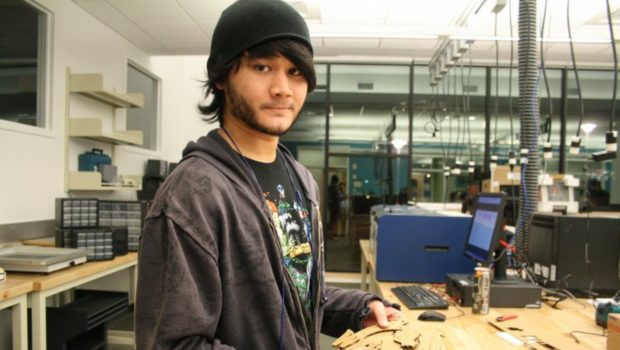Attracting manufacturing students, schools among top priorities at QCC event
WORCESTER – Business, academic and government leaders laid firm groundwork for October’s National Manufacturing Day events during a recent forum.
The event held at Quinsigamond Community College’s QuEST Center on Aug. 25 offers sobering statistics. Manufacturing occupies about 17% of the employment base in Central Massachusetts. Soon, 100,000 employees will be aging out or retiring from those jobs. “We hear all the time that employers get many applications. But they are not all from skilled people,” says Quinsigamond Community College (QCC) President Dr. Gail E. Carberry, Ed.D. “We are trying to get employers to not shred those applications but rather to work with us.”
QCC has forms that employers can hand out to applicants that they believe show promise. Additionally, Dr. Carberry says, “Refer them to us. We will school them, we will re-tool them, and we will work with you to make that individual to become viable.”
Getting active with students
Blackstone Valley Chamber of Commerce President Jeannie Hebert says this is the third year her organization will officially participate in National Manufacturing Day as a month-long celebration. Also, she found early success in partnering with schools to identify students with vocations for manufacturing. She has discovered there is a waiting list of students who want to enter vocational technical high schools.
“In meeting with superintendents, they have told me they don’t quite know what to do because they are busy preparing kids for college preparatory education,” Hebert says. “These kids are most at risk for dropping out of school.”
School tours in the works
Herbert notes that what the Valley is trying to do is get these students acquainted with local manufacturers. Last year, four busloads of students journeyed to local businesses and a few for day-long apprenticeship programs. “Some of those apprenticeships lead to actual employment for some of these students with one of them attending QCC,” says Hebert.
This year the chamber is looking to expand by bringing manufacturers into the classroom for presentations. Also, possibly customizing school curriculum for students poised to enter that industry.
Bill DiBenedetto, president of Lampin Corp. in Uxbridge who serves as chair on Hebert’s chamber manufacturing committee, says he can’t encourage his peers enough to get involved in local schools. “It really is an avenue of opportunity to reach out to middle and high schoolers in regular programs, not technical programs. We try to supplement that by giving kids an opportunity for an internship at Lampin.”
Alliance working with area voke schools
The state-wide Alliance for Vocational Technical Education affects six different voke schools in the region. There is a waiting list of about 3,500 students every year. A year ago this November, a workforce initiative lead by Secretary Jay Ash and Barry Bluestone from the Dukakis Institute at Northeastern helped inspire a proposed $75 million budget. It is for five years to upgrade equipment and expand vocational technical schools. Gov. Baker’s proposal was later pared down to $45 million in the state Legislature. However, in that funding allocation were 10 one million dollar planning grants. Also, Worcester was awarded funds to examine how to improve Worcester Vocational Technical High School.
In South County, Alexander and her members are getting excited about a new development. Set for September 2017 opening, the facility is known as the Innovation Technology Center. QCC in collaboration with local manufacturers, the Massachusetts Manufacturing Extension Partnership (MMEP) and Fitchburg State University, the center will address the need for skilled manufacturing professionals. More importantly, they will do so by expanding educational opportunities for area residents. QCC’s Southbridge location plans an expansion with a back lab and concentration in optics and photonics.
“What electronics were to the 20th century, optics and photonics will be to the 21st century. Our young people don’t even know that job exists in manufacturing,” says McNitt. “We need to make sure that people looking for those opportunities know where to go. Hopefully, we can help people understand that there are some great opportunities in manufacturing.”
Manufacturing careers advance
Most in attendance felt that even inside voke schools that support 20-plus educational programs, many kids don’t even consider manufacturing jobs. Also, with enhanced educational training at colleges like QCC. They don’t understand them to offer long-term, well paying, viable careers.
Targeting students and parents at the middle school level seems to be a growing target demographic as well as shifting manufacturing career tracks more under the auspices of STEM and pharmaceutical programming. This would raise further awareness that these future jobs are high tech and not dangerous.
Hebert says one of the more compelling programs she heard last year was offered by Wyman Gordon Corp. that came to talk in one of the schools. “If they followed the program and advanced from machine to machine, within 10 years with stock options they could be making six figures,” says Hebert.
Murray adds that his chamber is partnering with Worcester Public Schools and area superintendents this year to do more outreach and partnering with local manufacturers. Additionally, he suggests to invite local schools and manufacturers to come to QCC for a meet and greet.
Saint Gobain keeps it fun
Workforce pipeline development is something Saint Gobain is keenly interested in furthering. Nicole Zea, plant manager at Saint Gobain, says her company starts at high school and early college level for recruiting now, but needs to start earlier and build better partnerships. “One of the challenges we face is that we still may be one of the darker manufacturers in the sense that it is very much still traditional manufacturing.”
She adds that, “We do have many employees earning college degrees and masters while working with us. We are a big company with a lot of paths. You have the opportunity to go from a research job, to a manufacturing job to a marketing job. The individual needs to have that want and that drive. You may come and make $15-18 an hour and go home with a little dust on your hands, but give it two years and get some more training at QCC and then you’ll be able to move up.”






